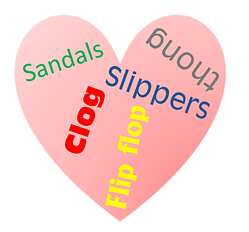Why I wrote this article?
According to renowned Professor Lera Boroditsky, words structure thinking far beyond our imagination. It has an immediate influence on our mood, a deferred consequence on our beliefs and a profound impact on how we structure our thinking.
This article unpacks her studies and gives handy recommendations about how to better manage our inner voice and its impacts on our psychology.
Read on…
Lately, I’ve had the privilege to meet a group of enlightened nice people over a 2 days retreat. Discussions were stellar, the mood was cool and the minds were wide open. I had a blast! ☺
At some point in time, a participant asked to borrow my sandals and called them slippers. I’m not used to precision when it comes to shoes but still promised myself to remember that word for future use. After all, why not?
Later during dinner, comments fused about the yummy dishes. We could hear people throwing things like “I LOVE roasted chicken”!
This could have gone unnoticed if… The next day, with tears in their eyes, people were talking about how “They LOVED their family”… It’s then that I literally bugged. I stood there open-mouthed for a few seconds. I was confused. Then my thoughts cleared up. I was wondering:
If we use that many words to describe precisely what kind of sandals we wear, why don’t we use more accurate language to talk about LOVE?

It’s obvious, we cannot LOVE our mothers like we LOVE our hobby. Neither can we LOVE our spouse like we LOVE food… I thought to myself, there is something wrong with humanity!!!
We mix up LOVE and desire. LOVE and pleasure…
…But if humans have enough time making up words for sandals, why can’t we refine our words to express things as noble as the LOVE?

Let’s get serious
It has been proven that our thoughts influence our language and vice versa. Professor Lera Boroditsky at Stanford University run numerous studies on the matter and found out incredible revelations. Here are a few:
Numbers: some languages do not have precise numbers. They would only use words like 1, 2 & many. No wonder those guys will never (re)invent algebra and that fair trade based on swap is not guaranteed ☺.

- Orientation: a tribe in Australia (Kuuk Thaayorre) does not have words for left/right and in front of/behind but rather… use cardinal coordinates! So they would say things like “Move a little bit the cup on the table North North East”. They greet each other by saying “Where are you headed?” and your answer could sound like this “I’m heading southeast”. 5 years old kids end up having a better sense of orientation that you and me ☺.

- Gender: a bridge is a feminine word in German and masculine in Spanish. When asked to describe attributes of a bridge, Spanish speakers would come up with mainly male stereotyped characteristics like “strong” and Germans would rather use words like “beautiful”, a trait more often associated with women.
- Witnesses: if someone broke a vase, Spanish speakers would report it as “the vase broke itself” while English ones would say “x broke the vase”. To understand the consequences of speaking in the passive vs. active mode, an experiment was conducted. Witnesses of a crime scene were split into 2 groups. Group 1 was asked to narrate what they saw exclusively in passive mode while Group 2 had to speak in active mode. Then witnesses were asked to recommend a sentence (judgment) to the jury. Those that spoke in the passive mode were less inclined to go for strong verdicts, the opposite behavior was observed for the second group.
These are only a handful of examples that provide scientific evidence that language influences our thoughts, decisions, and aptitudes.
No wonder why:
- Top public speakers carefully select each word they pronounce.
- During trials, lawyers make statements they know will be objected but still insidiously manipulate the jury doing so.
- Marketers spend hours polishing an ad script.
- Dictators control the media and hate (open) social networks unless they manage them themselves (Hello Mark ☺).
- …
Conversely, many are perfectly aware of the insidious influence words have in their day job and behave accordingly. For some reason, we tend to forget it in every other aspect of our lives.
Language does not only influence your thinking, but it also structures it.
Your brain is a supercomputer and your self-talk is the program it will run — @jimkwik
Click to tweet
What about negative self-talk?
We all tend to remind ourselves how much we suck. This may be fine as all of us are inclined to screw up at times. We tend to blame it on ourselves which is somehow positive as we take responsibility for our acts. Yet by no means should it become a habit.
The problem
Our subconscious brain carefully records those statements until they become a general indisputable truth (a limiting belief). Then, some morning we wake up and, somehow, negativity has stuck with us… we are convinced we suck, period!
As you may guess, these statements kill self-esteem. Maybe there is a better way.
The solution
To improve your self-talk, there are 2 important distinctions to bear in mind.
- Be specific: There is a difference between BEHAVING like a loser on a specific situation and BEING a total loser. You may be a total failure in basketball and still be a star in coding. Each time you miss a basket don’t stop at “I’m a total failure”, make sure you complete your sentence “I’m a total failure in basketball”. Remember, your subconscious brain is listening.
- Learn to distinguish between YOU and your ACTS. If you screw up in a situation, it doesn’t make you a loser. You may choose to paraphrase your (negative) thoughts this way “I’m a great dude who totally screwed-up in this specific situation”.
Internal communication hierarchy
In his brilliant book Predictably Irrational, Dan Ariely advises us to refrain from saying things our mind may misinterpret. Ranking from worst to best self-talk, below is a hierarchy to consider:

We now know the importance of positive self-talk and how to practice it in real life. So…
Watch Your Words! ☺
If interested in learning how to work with your nature and not against it, check out my book at WorkWithYourNature.com
